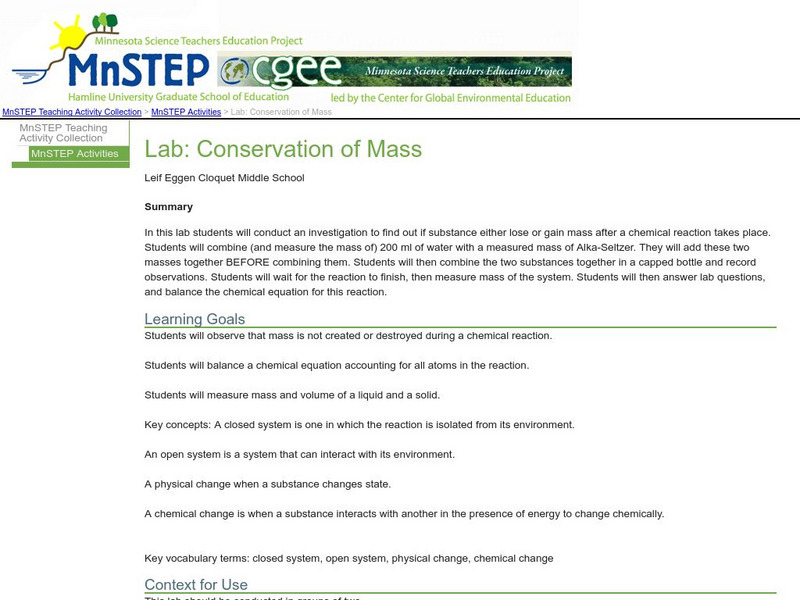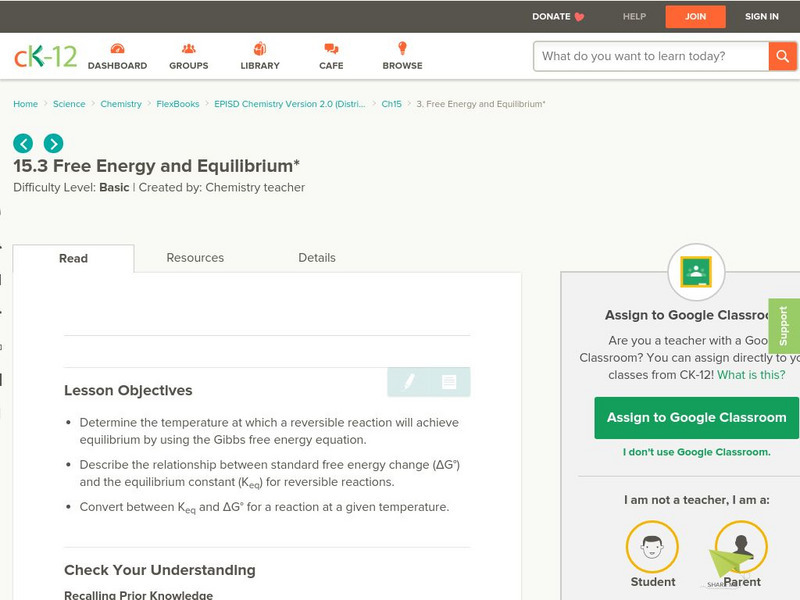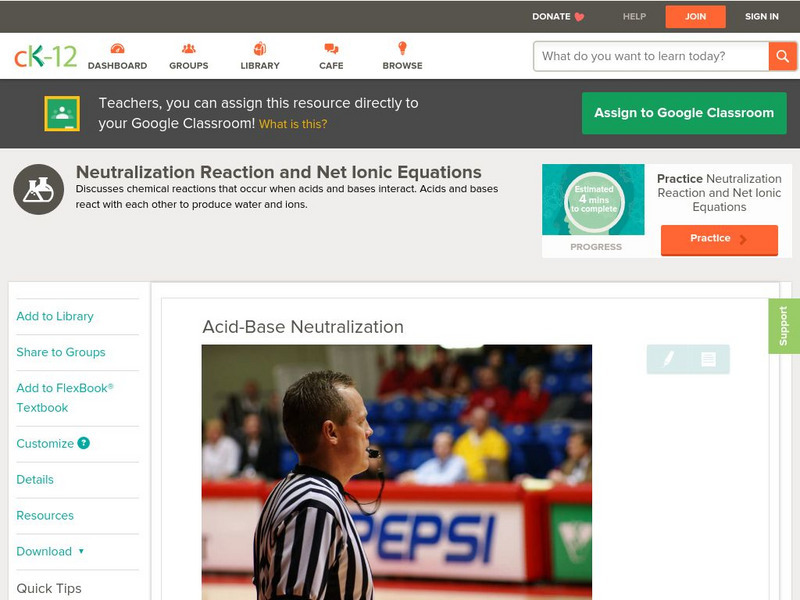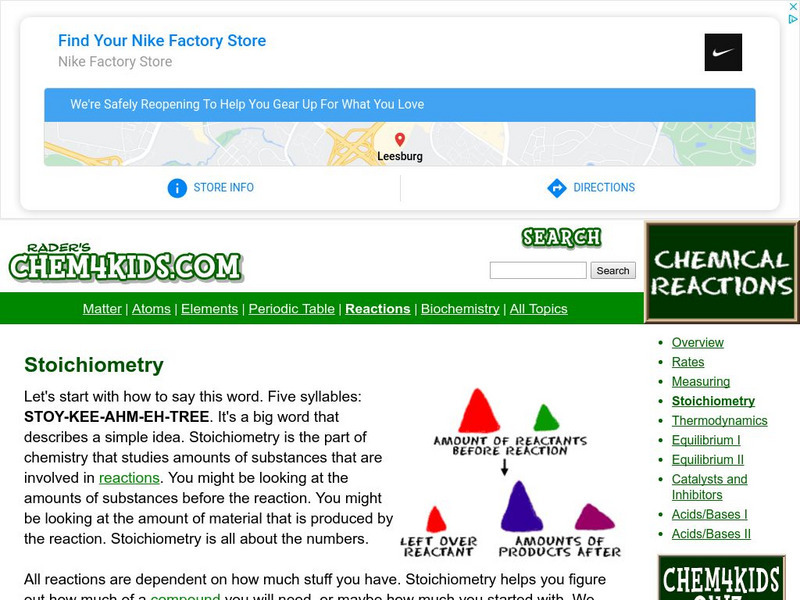BiologyWise
Biology Wise: Equation for Photosynthesis
Explains how to represent the chemical reaction that takes place in chloroplasts during photosynthesis in the form of an equation.
Science Struck
Science Struck: Understanding Decomposition Reaction
Explains what a decomposition is and gives examples of different types and their chemical equations.
BiologyWise
Biology Wise: Balanced Photosynthesis Equation
Explains how to balance the equation for the chemical reaction that takes place in chloroplasts during photosynthesis.
State University of New York
State University of New York: Hess's Law
Because reactions can be considered "additive," a series of reactions can be written like simultaneous mathematical equations and a net reaction determined by addition. To use this simulation, select individual reactions from the three...
Science Education Resource Center at Carleton College
Serc: Combustion or Oxidation
Students burn a magnesium strip to reinforce the concepts of chemical vs. physical changes, reaction types, conservation of mass, formulas and equations, stoichiometry, Lewis structures, and to explore the concept of oxidation/reduction...
Other
Fun Based Learning: Chemistry: Classic Chembalancer
An exercise for students to practice balancing equations. Exercise gives one equation per page and after the students complete the problem it tells them whether their answer is correct or not. A good basic practice for students who need...
CK-12 Foundation
Ck 12: Chemistry: Reactants and Products
[Free Registration/Login may be required to access all resource tools.] Defines reactant, product, and chemical equation.
Chiral Publishing
Chiral Publishing: An Introduction to Chemistry: Nuclear Energy: Study Guide [Pdf]
This chapter study guide about nuclear energy allows viewers to discover the main points of nuclear energy. Learn how to write nuclear equations, draw nuclide symbols, learn how nuclear energy is a major source of energy worldwide.
CK-12 Foundation
Ck 12: Radioactivity
[Free Registration/Login may be required to access all resource tools.] This lesson explains the types of radioactive decay and how to write nuclear equations. Includes simulations for learning about alpha and beta particle decay.
Science is Fun
Chemical of the Week: Sulfuric Acid
A brief description of sulfuric acid, its reactions, and its uses. Includes reaction equations.
Science Education Resource Center at Carleton College
Serc: Lab: Conservation of Mass
This lab experiment shows students that mass is not gained or lost during a chemical reaction. Lab also includes a set of lab questions that requires students to balance the chemical equation for the reaction that occurs in this lab.
CK-12 Foundation
Ck 12: Free Energy and Equilibrium
[Free Registration/Login may be required to access all resource tools.] Students determine the temperature at which a reversible reaction will achieve equilibrium by using the Gibbs free energy equation, and then describe the...
CK-12 Foundation
Ck 12: Salt Solutions
[Free Registration/Login may be required to access all resource tools.] Students begin by predicting whether a salt solution is acidic, basic, or neutral, and then practice writing balanced equations for hydrolysis reactions. They also...
National High Magnetic Field Laboratory
Magnet Academy: Svante Arrhenius
Svante Arrhenius was born in Vik, Sweden, and became the first native of that country to win the Nobel Prize. The award for chemistry was bestowed to him in honor of his theory of electrolytic dissociation. Arrhenius also developed the...
Chemistry Collective
Chem Collective: Acclimatization on Mt. Everest
To get to the top of the mountain before winter arrives, students must derive an equation that relates the necessary amount of hemoglobin to the partial pressure of oxygen at the current and next camp.
Frostburg State University
General Chemistry Online: Chemical Change Faq
Investigate the answers to many commonly asked questions about chemical change. This comprehensive list will address chemical equations and double displacement reactions in addition to other topics.
CK-12 Foundation
Ck 12: Physical Science: Acid Base Neutralization
[Free Registration/Login may be required to access all resource tools.] The reaction of acids and bases and what ions are produced and the salts that form.
CK-12 Foundation
Ck 12: Hess's Law and Standard Enthalpy of Formation
[Free Registration/Login may be required to access all resource tools.] Students will use Hess's law of heat summation to add chemical reactions together to produce a desired final equation, and then calculate the enthalpy change for...
CK-12 Foundation
Ck 12: Mole Ratios
[Free Registration/Login may be required to access all resource tools.] In this online tutorial students will relate balanced chemical equations to everyday analogies, such as a recipe. They will also define stoichiometry and use mole...
TeachEngineering
Teach Engineering: Heat Transfer: From Hot to Not
Young scholars learn the fundamental concepts of heat transfer and heat of reaction. This includes concepts such as physical chemistry, an equation for heat transfer, and a basic understanding of energy and heat transfer.
Chem4kids
Chem4 Kids: Stoichiometry
This site provides a great overview of stoichiometry, the part of chemistry that studies amounts of substances that are involved in reactions. Content focuses on what you measure, and includes two examples.
Frostburg State University
Frostburg State University Chemistry Online: Polyatomic Ions
A good reference page for anyone studying polyatomic ions. Tables included on this page organize polyatomic ions by family and by charge. Information on naming compounds with polyatomic ions is also provided. There is a link to an online...
American Chemical Society
Middle School Chemistry: Lesson Plans: Forming a Precipitate
Students investigate the concept of a precipitate by combining two clear, colorless solutions that produce a solid.
Dartmouth College
Dartmouth College: Chem Lab: Coordination Chemistry 3.1: Acid/base Analysis
In this experiment, you will examine the acidity of your coordination complex's water ligand. You will determine the acid dissociation constant of the complex by titrating it with a base. There are eight weeks of experiments in this series.

















